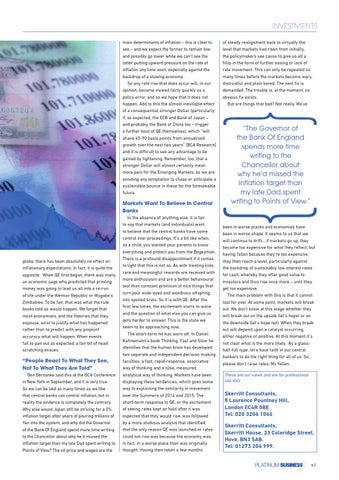INVESTMENTS main determinants of inflation – this is clear to see – and we expect the former to remain low and possibly go lower while we can’t see the latter putting upward pressure on the rate of inflation any time soon, especially against the backdrop of a slowing economy. So any rate rise that does occur will, in our opinion, become viewed fairly quickly as a policy error, and so we hope that it does not happen. Add to this the almost inevitable effect of a consequential stronger Dollar (particularly if, as expected, the ECB and Bank of Japan – and probably the Bank of China too – trigger a further bout of QE themselves), which “will shave 45-90 basis points from annualised growth over the next two years” [BCA Research] and it is difficult to see any advantage to be gained by tightening. Remember, too, that a stronger Dollar will almost certainly mean more pain for the Emerging Markets, so we are avoiding any temptation to chase or anticipate a sustainable bounce in these for the foreseeable future.
Markets Want To Believe In Central Banks
globe, there has been absolutely no effect on inflationary expectations. In fact, it is quite the opposite. When QE first began, there was many an economic sage who predicted that printing money was going to lead us all into a re-run of life under the Weimar Republic or Mugabe’s Zimbabwe. To be fair, that was what the rule books told us would happen. We forget that most economists, and the theories that they espouse, exist to justify what has happened rather than to predict with any pinpoint accuracy what will happen. When events fail to pan out as expected, a fair bit of head scratching ensues.
“People React To What They See, Not To What They Are Told” Ben Bernanke said this at the BCA Conference in New York in September, and it is very true. So we can be told as many times as we like that central banks can control inflation, but in reality the evidence is completely the contrary. Why else would Japan still be striving for a 2% inflation target after years of pouring trillions of Yen into the system, and why did the Governor of the Bank Of England spend more time writing to the Chancellor about why he’d missed the inflation target than my late Dad spent writing to Points of View? The oil price and wages are the
In the absence of anything else, it is fair to say that markets (and individuals) want to believe that the central banks have some control over proceedings. It’s a bit like when, as a child, you wanted your parents to know everything and protect you from the Bogeyman. There is a profound disappointment if it comes to light that this is not so. As with treating kids, rare and meaningful rewards are received with more enthusiasm and are a better behavioural tool than constant provision of nice things that turn your wide-eyed and wondrous offspring into spoiled brats. So it is with QE. After the first few times, the excitement starts to wane and the question of what else you can give us gets harder to answer. This is the state we seem to be approaching now. The short-term hit has worn off. In Daniel Kahnemann’s book Thinking, Fast and Slow he identifies that the human brain has developed two separate and independent decision-making faculties: a fast, rapid-response, associative way of thinking and a slow, measured, analytical way of thinking. Markets have been displaying these tendencies, which goes some way to explaining the similarity in movement over the Summers of 2014 and 2015. The short-term response to QE, or the excitement of seeing rates kept on hold after it was expected that they would rise, was followed by a more studious analysis that identified that the only reason QE was launched or rates could not rise was because the economy was, in fact, in a worse place than was originally thought. Having then taken a few months
of steady realignment back to virtually the level that markets had risen from initially, the policymakers see cause to give us all a fillip in the form of further easing or lack of rate movement. This can only be repeated so many times before the markets become wary, distrustful and plain bored. The next fix is demanded. The trouble is, at the moment, no obvious fix exists. But are things that bad? Not really. We’ve
“The Governor of the Bank Of England spends more time writing to the Chancellor about why he’d missed the inflation target than my late Dad spent writing to Points of View.”
been in worse places and economies have been in worse shape. It seems to us that we will continue to drift… if markets go up, they become too expensive for what they reflect, but having fallen because they’re too expensive, they then reach a level, particularly against the backdrop of sustainably low interest rates for cash, whereby they offer good value to investors and thus rise once more – until they get too expensive. The main problem with this is that it cannot last for ever. At some point, markets will break out. We don’t know at this stage whether they will break out on the upside (let’s hope) or on the downside (let’s hope not). When they break out will depend upon a catalyst occurring, either negative or positive. At this moment it’s not clear what is the more likely. As a glasshalf-full type, let’s have faith in our central bankers to do the right thing for all of us. So, please don’t raise rates, Ms Yellen. These are our views and are for professional use only
Skerritt Consultants, 8 Laurence Pountney Hill, London EC4R 0BE Tel: 020 3206 1066 Skerritt Consultants, Skerritt House, 23 Coleridge Street, Hove, BN3 5AB. Tel: 01273 204 999. 43
